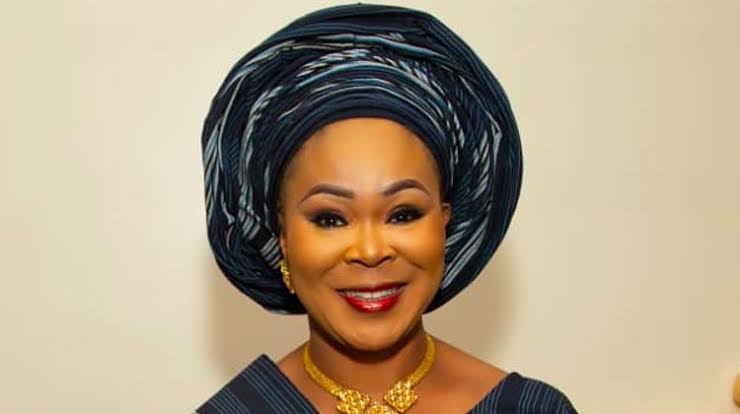News
Tinubu’s Minister backs Niger orphan mass wedding, to undergo HIV tests

By Kayode Sanni-Arewa
The Minister of Women Affairs, Uju Kennedy-Ohanenye, on Thursday, announced scholarships and gave various gift items to 100 orphaned girls in Niger State, ahead of their mass wedding, the mass wedding is being sponsored by the Speaker of the state House of Assembly, Abdulmalik Sarkindaji.
The orphans will also undergo various medical tests including HIV.
Recall the minister had kicked against the mass wedding of the young girls, saying it was a violation of the Child Rights Act.
Kennedy-Ohanenye, who addressed a press conference in Abuja, noted that she had petitioned the Inspector General of Police to stop the wedding, adding that she also filed a lawsuit, seeking an injunction to restrain the Speaker from going ahead with the mass wedding.
In response, the Speaker lambasted the minister for dabbling into a religious and cultural issue she did not understand.
He said the minister acted without first making any effort to understand the circumstances that confronted the girls, which made it necessary for their weddings to be sponsored.
The Speaker also received the backing of the Niger State Council of Imams and the Muslim Rights Concern, which both warned the minister to steer clear of the mass wedding, which they insisted must go on as scheduled.
Ahead of the mass wedding, the minister, represented by her Special Assistant on Private Sector, Adaji Usman, was in Niger to announce scholarships for the girls and to also give them other items, such as wrappers and foodstuffs.
The items were given out to the 100 young girls at the palace of the Emir of Kontagora, Mohammed Muazu.
The minister, through Usman, presented 10 Point of Sale machines, 100 wrappers and 350 bags of 10kg bags of rice.
She announced a scholarship to university level for any of the girls who wish to go to school.
Also, the Emir of Kontagora announced the donation of a sewing machine to each of the girls
Kennedy-Ohanenye also directed that bank accounts be opened for all the 100 intending brides where a stipend will be sent to them for the next six months to enable them to settle down in their husband’s houses
She blamed the media for escalating the initial controversy surrounding the marriage of the 100 orphans, saying “I did not intend to stop the marriage but to be sure if the girls are of marriageable age and were not being forced into it.
“Every parent will want to marry out her wards if they attain the right age for marriage. The initial opposition to the planned marriage was misunderstood, hence the media war between my office and the Speaker’s.”
While thanking the Speaker for the way the issue was handled, the minister promised that the girls would be closely monitored in their various husband’s houses so that the objectives of the empowerment scheme would not be defeated.
In his remarks, the Speaker said it was regrettable that this intention to support the marriage of the 100 girls was politicised.
He said, “It was pure politics from my constituency. They misinformed the minister that I am playing politics with the lives of the children by forcing them into marriage.
“And the minister, because of her passion for women and the girl child, quickly waded into the matter even though she could not find out the true position of things and the media began to amplify the whole matter.
“But thank God today I have been vindicated. The minister and the whole world have seen that these girls are of marriageable age and nobody is forcing them into it. It is being done with their consent.
“I decided to support the marriage out of genuine concern for these girls, the majority of whom are orphans as a result of the insecurity in my constituency. It was with a pure heart.
“I equally commend the minister for this empowerment scheme for the girls; she has shown that she is a mother and really meant well for the girl child in this country.”
In his remarks, the Emir thanked God for the peaceful resolution of the matter.
He disclosed that all the necessary medical tests, including HIV/AIDS, genotype, Hepatitis B and pregnancy tests, were conducted and the results were handed over to the representatives of the minister.
News
BREAKING! Finally, White Smoke Emerges From Sistine Chapel as Vatican Elects New Pope

Finally, white smoke emerged from the Sistine Chapel on the evening of Thursday, May 8, signalling that the Vatican has elected a new Pope. The cardinal selected to succeed Pope Francis will be announced in due course.
On Wednesday, 133 cardinals entered the chapel for a deeply choreographed ritual that has preceded the election of every Pope since 1179. The first session started with a vow of secrecy—excommunication awaits anyone who leaks details of the votes—followed by the vote.
Once the numbers were tallied, the votes were burned in a special stove set up inside the chapel. Yesterday’s black smoke informed the public that the cardinals had yet to make their decision.
The papal conclave is a centuries-old process with modern-day consequences.
Francis’ 12-year pontificate was pivotal, not just for the church, but for the globe. His advocacy for care of migrants and the poor, his tolerance for homosexuality, and his denunciation of climate change and conflicts in Gaza and Ukraine helped reset the world’s moral compass.
Yet within the church, his reformist interpretation of church doctrine—”Who am I to judge?” he famously responded when asked to weigh in on gay priests—set off a polarizing struggle between modernists and traditionalists. So too has his big tent inclusivity that welcomed practitioners of all kinds, and invited many of them, even members of the LGBTQ community and lay women, to sit with bishops and contribute their thoughts on the direction of the church in meetings called synods. It is this vision of synodality—the church as a listening one instead of a top-down enforcer of doctrine—that is at the core of Francis’ progressivism, and the biggest threat to traditionalists who want to maintain the power and influence of bishops and cardinals.
Every conclave, at its most fundamental, is a referendum on the previous pope’s legacy. Behind closed doors and sworn to secrecy, the cardinals will have had to decide if the new pope is one to continue on Francis’ radically inclusive path, or someone who will roll back his policies in favor of a more inward-looking church focused on doctrine.
That will have repercussions in a tense historical moment of religious and ethnic strife exacerbated by conflict, climate change, rising nationalism and anti-migrant sentiment are coming to the fore, says Alberto Melloni, a Vatican historian who is the director of the John XXIII Foundation for Religious Sciences in Bologna, Italy. There are relatively few global figures who can move opinion, drive conversation, and call for change like a pope. “It will be very different if we have a pope who is more worried about ideological topics of tradition than someone who makes the unity of the human family and care for the planet the first point in his agenda,” says Melloni.
There are 252 cardinals, but only those under the age of 80 took part in the conclave. Of the 133 cardinals that voted, Francis appointed 108.
Over the past several years, Francis sought to elevate bishops from underrepresented places such as Myanmar, Rwanda, and East Timor to the college of cardinals to better represent the scope of global Catholicism. Coming from wildly varying cultural backgrounds, they do not align on any consistent ideological spectrum. Many of them are more conservative on issues of homosexuality and women, even if they embrace Francis’ focus on other kinds of inclusivity. That made for a very unpredictable vote, says Melloni. “It is not liberals vs. conservatives. It is not donkeys and elephants facing one another across the aisle. It is a collage of people divided into very small groups,” aligned by theological leanings, doctrinal philosophy, or missionary experience.
Given the stakes, the competing agendas, and the constantly shifting micro alliances and priorities, it was impossible to predict from the outset who will ultimately get support from two-thirds of a very divided electorate, faced with one of the most, if not the most, important decisions of their career. “The only thing we can say with any confidence is that we’ll have a male pope,” says Melloni, when pressed to hazard a guess for the outcome ahead of the papal election.
Most of the politicking has already been done, conducted in private over informal meetings and at dinners in the nearby guesthouse where the cardinals stay. Overt campaigning is frowned upon, but it is not uncommon for trusted “kingmaker” cardinals to push for the candidates that share their values and vision for the church.
Once a papal election starts, the cardinals cannot leave the conclave except in rare cases, and they are cut off from the rest of the word, with no access to phones, the internet or even newspapers (the word conclave comes from the Latin “with key,” as in, locked up.)
Inside the chapel, the electors share a brief prayer and take an oath to observe the sanctity of the process before handwriting the name of their chosen candidate on a piece of folded paper. One by one, the cardinals will deposit their votes in a special urn. Once voting is done, the votes are tallied, then burned.
News
Reps To Host National Summit On Security Over Plateau Killings

At the same time, the lawmakers also called on the President to take immediate steps by deploying security forces to the most affected areas, particularly Bokkos and Bassa—and to extend protection to other communities at risk.
Lawmakers also pressed for urgent humanitarian action, as relief items were requested for those caught in the crisis, and the ministry responsible for humanitarian matters was told to design a long-term recovery plan for the devastated villages.
This decision came after a motion was raised by Rep. Daniel Asama, who stressed the need to act swiftly. He pointed out that people living in and around Jos, especially in Bokkos and Bassa have endured wave after wave of attacks.
He painted a grim picture: “Families torn apart, homes burned down, farms abandoned, and entire communities uprooted. He insisted the violence must end and the displaced must be supported before the situation worsens.
News
Rep Push For Construction Of Additional Camps for NYSC Participants In States

-

 Entertainment13 hours ago
Entertainment13 hours agoI’m broke yet accused of money laundering – VDM breaks silence after EFCC release
-

 News23 hours ago
News23 hours agoJust in: Finally, EFCC bows to pressure, releases VDM
-

 News5 hours ago
News5 hours agoBreaking: Three Serving PDP HoR Members Defect to APC
-

 News13 hours ago
News13 hours agoEdo police rescue kidnapped PDP chairman, 36 others
-

 News14 hours ago
News14 hours agoTomato Ebola Causes Loss of N1.3 Billion, Contributing to Rising Food Prices
-

 News7 hours ago
News7 hours agoFinally, IMF deletes Nigeria from its debtors list
-

 News33 minutes ago
News33 minutes agoBREAKING! Finally, White Smoke Emerges From Sistine Chapel as Vatican Elects New Pope
-

 News14 hours ago
News14 hours agoSad! Five members of one family die of food poisoning





